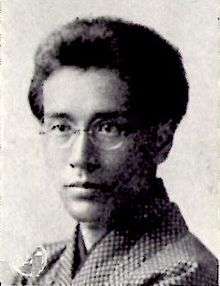Tetsuzō Tanikawa
Tetsuzō Tanikawa (谷川 徹三, Tanikawa Tetsuzō, 26 May 1895 – 27 September 1989) was a Japanese philosopher who promoted the concept of World Government for purposes of peace.
Tetsuzō Tanikawa | |
|---|---|
 | |
| Born | 26 May 1895 |
| Died | September 27, 1989 (aged 94) |
| Era | 20th-century philosophy |
| Region | Japanese philosophy |
Main interests | World Government |
Influences
| |
Career
Tanikawa studied in the Department of Philosophy at the University of Kyoto, where he was one of the students of Kitaro Nishida, the leader of the Kyoto School.[1][2]
Tanikawa introduced philosophical ideas in Japan through his translations of Georg Simmel and Immanuel Kant. His major philosophical influence was Johann Wolfgang von Goethe. He questioned how world peace could be realized in the face of nuclear proliferation at the beginning of the Cold War.
He was the father of the poet Shuntarō Tanikawa.
gollark: I mean, sort of, division by zero is undefined and all.
gollark: It grew infinity percent today! INFINITY PERCENT!
gollark: The cult of transistors is the server's fastest-growing cult!
gollark: Without transistors, we would be in the 1950s, approximately!
gollark: So what? Without the horse there probably wouldn't be cars. That doesn't make horses good.
References
- "Tanikawa Tetsuzō". 20世紀日本人名事典 (in Japanese). 日外アソシエーツ. Retrieved 13 March 2018.
- "Tanikawa Tetsuzō". Kotobanku (in Japanese). Asahi Shinbun. Retrieved 13 March 2018.
This article is issued from Wikipedia. The text is licensed under Creative Commons - Attribution - Sharealike. Additional terms may apply for the media files.